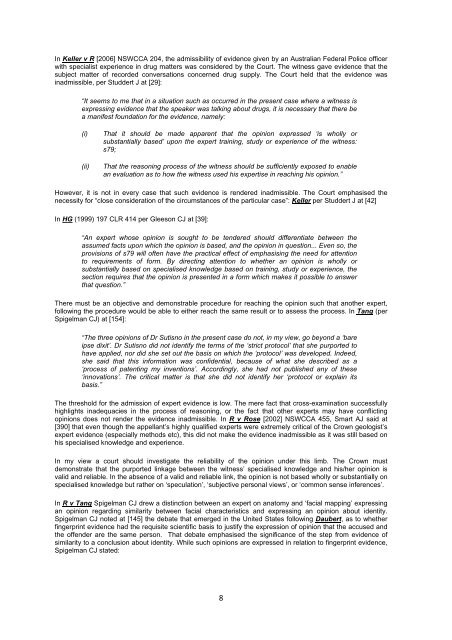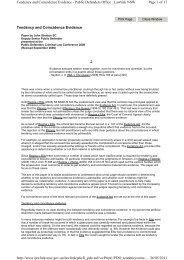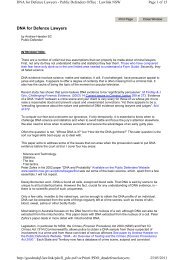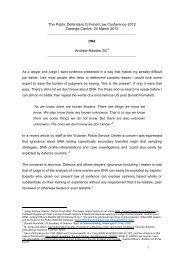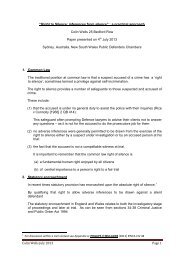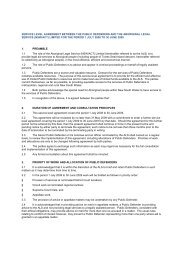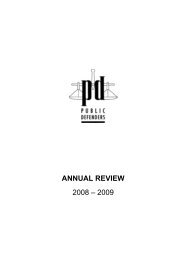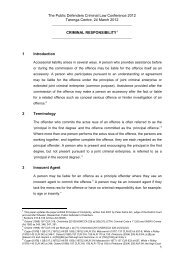Expert Evidence, by Dina Yehia SC - The Public Defenders
Expert Evidence, by Dina Yehia SC - The Public Defenders
Expert Evidence, by Dina Yehia SC - The Public Defenders
You also want an ePaper? Increase the reach of your titles
YUMPU automatically turns print PDFs into web optimized ePapers that Google loves.
In Keller v R [2006] NSWCCA 204, the admissibility of evidence given <strong>by</strong> an Australian Federal Police officer<br />
with specialist experience in drug matters was considered <strong>by</strong> the Court. <strong>The</strong> witness gave evidence that the<br />
subject matter of recorded conversations concerned drug supply. <strong>The</strong> Court held that the evidence was<br />
inadmissible, per Studdert J at [29]:<br />
“It seems to me that in a situation such as occurred in the present case where a witness is<br />
expressing evidence that the speaker was talking about drugs, it is necessary that there be<br />
a manifest foundation for the evidence, namely:<br />
(i)<br />
(ii)<br />
That it should be made apparent that the opinion expressed ‘is wholly or<br />
substantially based’ upon the expert training, study or experience of the witness:<br />
s79;<br />
That the reasoning process of the witness should be sufficiently exposed to enable<br />
an evaluation as to how the witness used his expertise in reaching his opinion.”<br />
However, it is not in every case that such evidence is rendered inadmissible. <strong>The</strong> Court emphasised the<br />
necessity for “close consideration of the circumstances of the particular case”: Keller per Studdert J at [42]<br />
In HG (1999) 197 CLR 414 per Gleeson CJ at [39]:<br />
“An expert whose opinion is sought to be tendered should differentiate between the<br />
assumed facts upon which the opinion is based, and the opinion in question... Even so, the<br />
provisions of s79 will often have the practical effect of emphasising the need for attention<br />
to requirements of form. By directing attention to whether an opinion is wholly or<br />
substantially based on specialised knowledge based on training, study or experience, the<br />
section requires that the opinion is presented in a form which makes it possible to answer<br />
that question.”<br />
<strong>The</strong>re must be an objective and demonstrable procedure for reaching the opinion such that another expert,<br />
following the procedure would be able to either reach the same result or to assess the process. In Tang (per<br />
Spigelman CJ) at [154]:<br />
“<strong>The</strong> three opinions of Dr Sutisno in the present case do not, in my view, go beyond a ‘bare<br />
ipse dixit’. Dr Sutisno did not identify the terms of the ‘strict protocol’ that she purported to<br />
have applied, nor did she set out the basis on which the ‘protocol’ was developed. Indeed,<br />
she said that this information was confidential, because of what she described as a<br />
‘process of patenting my inventions’. Accordingly, she had not published any of these<br />
‘innovations’. <strong>The</strong> critical matter is that she did not identify her ‘protocol or explain its<br />
basis.”<br />
<strong>The</strong> threshold for the admission of expert evidence is low. <strong>The</strong> mere fact that cross-examination successfully<br />
highlights inadequacies in the process of reasoning, or the fact that other experts may have conflicting<br />
opinions does not render the evidence inadmissible. In R v Rose [2002] NSWCCA 455, Smart AJ said at<br />
[390] that even though the appellant’s highly qualified experts were extremely critical of the Crown geologist’s<br />
expert evidence (especially methods etc), this did not make the evidence inadmissible as it was still based on<br />
his specialised knowledge and experience.<br />
In my view a court should investigate the reliability of the opinion under this limb. <strong>The</strong> Crown must<br />
demonstrate that the purported linkage between the witness’ specialised knowledge and his/her opinion is<br />
valid and reliable. In the absence of a valid and reliable link, the opinion is not based wholly or substantially on<br />
specialised knowledge but rather on ‘speculation’, ‘subjective personal views’, or ‘common sense inferences’.<br />
In R v Tang Spigelman CJ drew a distinction between an expert on anatomy and ‘facial mapping’ expressing<br />
an opinion regarding similarity between facial characteristics and expressing an opinion about identity.<br />
Spigelman CJ noted at [145] the debate that emerged in the United States following Daubert, as to whether<br />
fingerprint evidence had the requisite scientific basis to justify the expression of opinion that the accused and<br />
the offender are the same person. That debate emphasised the significance of the step from evidence of<br />
similarity to a conclusion about identity. While such opinions are expressed in relation to fingerprint evidence,<br />
Spigelman CJ stated:<br />
8


